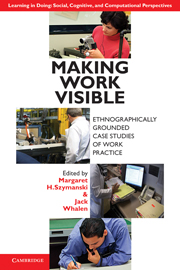Book contents
- Frontmatter
- Contents
- List of Figures and Excerpts
- List of Tables
- List of Contributors
- Series Foreword
- Foreword by John Seely Brown
- Acknowledgments
- Introduction
- Part I Work Practice Study in Historical Context
- Part II Applying Work Practice Methods
- Part III Practices around Documents
- Part IV The Customer Front
- Part V Learning and Knowledge Sharing
- Part VI Competency Transfer
- References
- Index
- LEARNING IN DOING: SOCIAL, COGNITIVE AND COMPUTATIONAL PERSPECTIVES
Foreword by John Seely Brown
Published online by Cambridge University Press: 05 August 2012
- Frontmatter
- Contents
- List of Figures and Excerpts
- List of Tables
- List of Contributors
- Series Foreword
- Foreword by John Seely Brown
- Acknowledgments
- Introduction
- Part I Work Practice Study in Historical Context
- Part II Applying Work Practice Methods
- Part III Practices around Documents
- Part IV The Customer Front
- Part V Learning and Knowledge Sharing
- Part VI Competency Transfer
- References
- Index
- LEARNING IN DOING: SOCIAL, COGNITIVE AND COMPUTATIONAL PERSPECTIVES
Summary
I was delighted to learn that this book was being written covering the pioneering efforts of the social scientists at Xerox, especially given that many of these efforts were undertaken long before ethnographic research had become de rigueur in today's corporate and design worlds. For me, personally, this journey has been extraordinary. After all, I started out as a hard-core computer scientist and an AI junkie with a strong leaning toward cognitive modeling. To many, I have now become a softie, questioning nearly all of the ontological and epistemological assumptions I had embraced in graduate school. This transformation emerged from my rich interactions with many of the authors in this book – especially Lucy Suchman, Gitti Jordan, Jack Whalen, and Marilyn Whalen – but it also emerged from the frequent encounters PARC had with the challenges that were arising in the Xerox world as copiers became more complex to operate and maintain and as the document became the currency of the modern age. These challenges were often more usefully unpacked by the methodologies and sensibilities discussed in this book than by the more formal tools and sensibilities of traditional computer science, engineering, and operations research. These challenges, when properly framed, were tied to the context of work and were more easily met by leveraging the “invisible” resources in the context both to get the job done and to facilitate collective learning.
- Type
- Chapter
- Information
- Making Work VisibleEthnographically Grounded Case Studies of Work Practice, pp. xxi - xxviPublisher: Cambridge University PressPrint publication year: 2011
- 1
- Cited by



